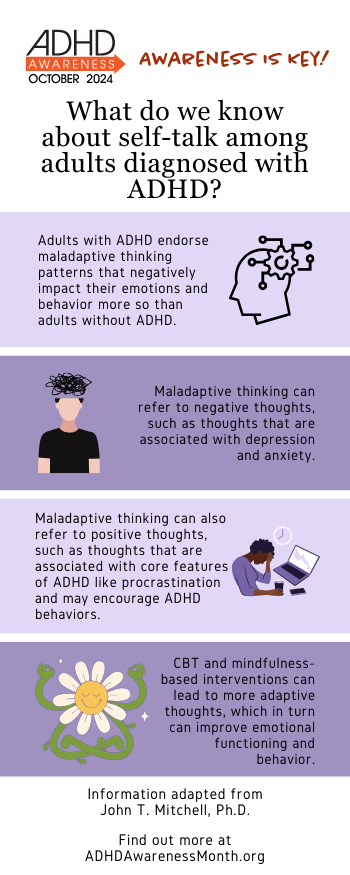Adults with ADHD often have unhelpful thoughts, like negativity and overestimating abilities, worsening emotions and behavior.

Adults with ADHD endorse more maladaptive thinking patterns than those without ADHD. Maladaptive thinking can refer to negative thoughts, such as thoughts that are associated with depression and anxiety. An example might include thoughts like “I can’t do this” or “I’m no good.” Such thoughts are associated with more negative mood states, like depression and anxiety.
Maladaptive thinking can also refer to positive thoughts, such as thoughts that are associated with core features of ADHD like procrastination. An example might include thoughts like “I’m better at doing things at the last minute” or “I thrive under pressure.” Such thoughts—though phrased in a positive way—can be maladaptive if they encourage ADHD behaviors.
Treatments like cognitive-behavioral therapy and mindfulness-based interventions help to teach adults with ADHD how to engage with their habitual thought patterns in a different way that can lead to more adaptive thoughts, which in turn can improve emotional functioning and behavior.
About the Author:

John T. Mitchell, Ph.D., is an Associate Professor of Psychiatry and Behavioral Sciences at Duke University School of Medicine. His research interests include ADHD across the lifespan and treatment development, including the application of mindfulness-based interventions for ADHD.
References:
- Mitchell, J.T., Benson, J.W., Knouse, L.E., Kimbrel, N.A., & Anastopoulos, A.D. (2013). Are negative automatic thoughts associated with ADHD in Adulthood? Cognitive Therapy and Researach, 37(4): 851-859. DOI 10.1007/s10608-013-9525-4
- Knouse LE, Mitchell JT, Kimbrel NA, Anastopoulos AD. Development and Evaluation of the ADHD Cognitions Scale for Adults. J Atten Disord. 2019 Aug;23(10):1090-1100. doi: 10.1177/1087054717707580. Epub 2017 May 21. PMID: 28528555; PMCID: PMC5665714.
- Knouse LE, Mitchell JT. Incautiously Optimistic: Positively-Valenced Cognitive Avoidance in Adult ADHD. Cogn Behav Pract. 2015 May;22(2):192-202. doi: 10.1016/j.cbpra.2014.06.003. PMID: 25908901; PMCID: PMC4403795.
- Torrente F, López P, Alvarez Prado D, Kichic R, Cetkovich-Bakmas M, Lischinsky A, Manes F. Dysfunctional cognitions and their emotional, behavioral, and functional correlates in adults with attention deficit hyperactivity disorder (ADHD): is the cognitive-behavioral model valid? J Atten Disord. 2014 Jul;18(5):412-24. doi: 10.1177/1087054712443153. Epub 2012 May 24. PMID: 22628149.
- Pan MR, Zhang SY, Chen CL, Qiu SW, Liu L, Li HM, Zhao MJ, Dong M, Si FF, Wang YF, Qian QJ. Bidirectional associations between maladaptive cognitions and emotional symptoms, and their mediating role on the quality of life in adults with ADHD: a mediation model. Front Psychiatry. 2023 Jul 19;14:1200522. doi: 10.3389/fpsyt.2023.1200522. PMID: 37547201; PMCID: PMC10400449.
